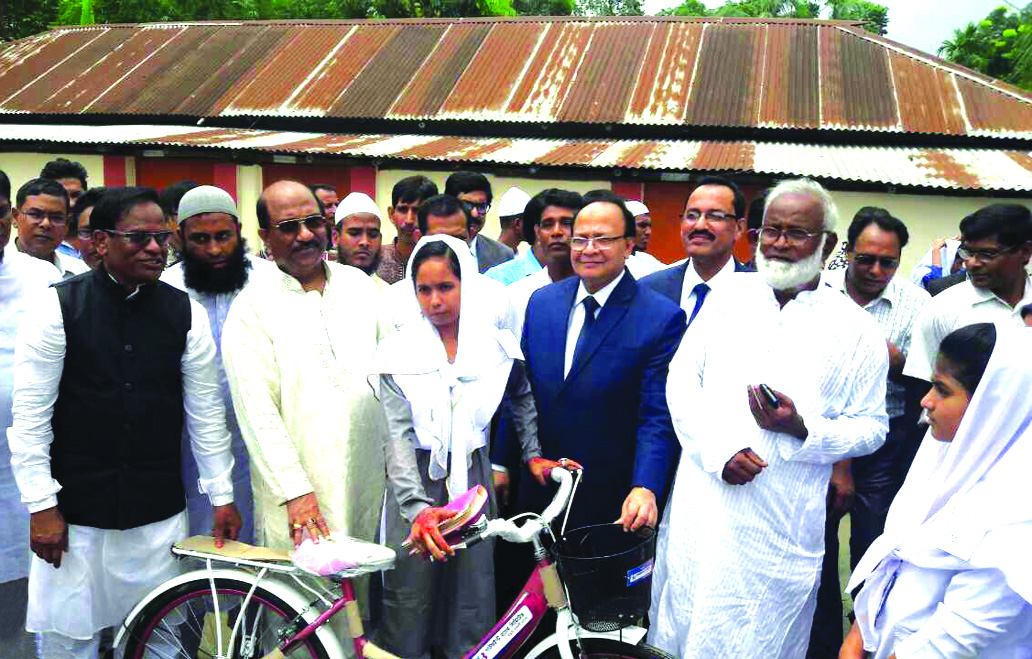PBL Exchange (UK) Limited, London, Birmingham and Oldham branch of Prime Bank Limited arranged an `Eid Reunion` recently in UK to boost-up inward remittance. Deputy Managing Director of the bank Habibur Rahman, Assistant High Commissioner of Bangladesh Fe
 PBL Exchange (UK) Limited, London, Birmingham and Oldham branch of Prime Bank Limited arranged an `Eid Reunion` recently in UK to boost-up inward remittance. Deputy Managing Director of the bank Habibur Rahman, Assistant High Commissioner of Bangladesh F
PBL Exchange (UK) Limited, London, Birmingham and Oldham branch of Prime Bank Limited arranged an `Eid Reunion` recently in UK to boost-up inward remittance. Deputy Managing Director of the bank Habibur Rahman, Assistant High Commissioner of Bangladesh F
M Kamal Hossain, Managing Director of Southeast Bank Limited, handing over 100 ladies bicycle among underprivileged school and college girls of Lalpur-Bagatipara Upazila, Natore on Saturday. Shitangshu Kumar Sur Chowdhury, Deputy Governor, Bangladesh Bank
 M Kamal Hossain, Managing Director of Southeast Bank Limited, handing over 100 ladies bicycle among underprivileged school and college girls of Lalpur-Bagatipara Upazila, Natore on Saturday. Shitangshu Kumar Sur Chowdhury, Deputy Governor, Bangladesh Bank
M Kamal Hossain, Managing Director of Southeast Bank Limited, handing over 100 ladies bicycle among underprivileged school and college girls of Lalpur-Bagatipara Upazila, Natore on Saturday. Shitangshu Kumar Sur Chowdhury, Deputy Governor, Bangladesh Bank
Low CPIA ratings risk WB support for BD
Bangladesh's recurrent slippage in the World Bank's country policy and institutional assessment (CPIA) ratings risks continuity of the Bank's support for the country, says its report that is yet to be made public.
The CPIA report is learnt to have cited mainly poor performance in structural policy, public-sector management and institutional reforms, while its one official finds 'fragile democracy' as a drawback.
The Washington-based global development financier, in its CPIA report, shows Bangladesh's score in "Structural policies" having slipped to 3.3 out of total 6.0 in the last calendar year, 2016, from its highest achievement of 3.5 in 2009.
In "Public sector management and institutions" cluster, the country score plunged to 2.8 in 2016 from a peak of 3.0 in 2007.
The score (2.8) is even lower than the average score (3.0) of the WB borrowing countries, the Bank in its report said.
The Bank shared the findings in the CPIA 2016 report with Bangladesh government recently.
An official at the WB Dhaka office told the FE that if Bangladesh could not improve upon its CPIA ratings, its financial and other supports from the multilateral financier could be affected in the near future.
"How much we will extend our cooperation to a particular country depends on the CPIA report. If Bangladesh does well in the report, its support definitely will be improved. However, if the CPIA report shows Bangladesh's performance bad, WB's future support will be affected," he said, requesting anonymity as the CPIA report is yet to be published.
The WB assesses its borrowing countries' performance against a set of 16 criteria grouped into four clusters: economic management; structural policies; policies for social inclusion and equity; and public-sector management and institutions.
Concessional loans and grants from WB's soft window -- the International Development Association (IDA) -- are allocated to a country on per-capita terms based on its IDA country-performance rating and, to a limited extent, based on its per-capita gross national income (GNI).
The lender said this ensures that good performers receive a higher IDA allocation in per-capita terms. The IDA Resource Allocation Index (IRAI) is a key element in the country-performance ratings.
WB's IRAI is based on the results of the annual CPIA exercise, which covers the IDA-eligible countries.
Country assessments have been carried out annually since the mid-1970s by World Bank staff. Over time the criteria have been revised from a largely macroeconomic focus to include governance aspects and a broader coverage of social and structural dimensions, the WB said.
The WB official further told the FE that Bangladesh is still far behind from improving the structural policy as its trade liberalisation, financial-sector reform and its governance, and business-regulatory environment are still weak in position.
The business-regulatory environment is weaker than many other WB- member countries, affecting trade and investment here, the official said quoting the latest CPIA report.
Similarly, in its view, Bangladesh has been continuously doing worse over the years in property rights and rule-based governance, quality of budgetary and financial management, efficiency of revenue mobilisation, quality of public administration, and transparency, accountability and corruption in the public-sector categories.
"Bangladesh has a scope to improve its scores in those categories. But the weak and fragile democracy is creating hindrance to the upgradation of the country's ranking," he said.
Meanwhile, Bangladesh has done comparatively better in two other clusters: economic management and policies for social inclusion/equity.
In the two clusters, Bangladesh has scored 4.0 and 3.5 respectively. The scores are higher than the average scores of 3.4 and 3.2 respectively among all the member-countries of the global lender in the CPIA report 2016.
Banks likely to get exemption from forming subsidiaries
The country's scheduled banks are likely to get permanent exemption from setting up subsidiary companies for providing 'security custodial services' as the central bank finds it unnecessary, officials said.
General Manager of the Bangladesh Bank (BB) Abu Farah Md Naser recently sought permission of the Ministry of Finance (MoF) to exempt the banks from July next year once the temporary exemption expires, they added.
Custodial services are specialised financial services for safeguarding a client's financial investment/financial securities like stocks and bonds.
According to the Section 7 (3) of the Bank Companies Act, 1991, the banks need to form separate subsidiaries to provide security custodial services. In this case, they need prior permission from the central bank and get registration from the Bangladesh Securities and Exchange Commission (BSEC).
Officials said the Bank Companies Act, 1991 was amended in 2013 incorporating the provision to reduce banks' involvement in stock markets and separate their stock market-related activities from commercial banking.
After the amendment of the Act, four foreign banks operating in Bangladesh sought exemption from such an obligation since their head offices are not interested to form subsidiaries considering the size of Bangladesh's stock market.
As the four banks bring major portion of foreign portfolio investment in Bangladesh's stock markets, the central bank agreed to exempt them from the compulsion of forming subsidiaries for continuation of foreign investment.
They were given the exemption for five years, until July 2018, which later was extended to all scheduled banks in the country.
Recently, two foreign banks again sought the central bank's permission for continuing security custodial services for an indefinite period without forming separate subsidiaries.
Mr Naser, in his letter to the MoF, said other banks also may seek similar facility again soon. The reasons, which were taken into consideration in the past before granting exemption to the banks, still persist.
Besides, since the custodial services providers do not provide loans in stock market, the banks do not have the scope for exposure in the bourses, he noted.
Mr Naser also said the central bank considers positively granting exemption to the banks from forming separate subsidiaries.
He also said the permanent exemption to all the scheduled banks from the concerned clause of the Bank Companies Act 1991 can be granted once the current temporary exemption expires next year.
A senior MoF official told the FE they are examining the clause concerned of the Bank Companies Act based on the central bank's proposal.
Permission will be given for permanent exemption to the banks if the proposal is found rational and not conflicting to other clauses, he noted.
WB awards state-run SDF for anti-poverty campaign
The World Bank has awarded the state-run Social Development Foundation (SDF) for its successful anti-poverty campaign with an extra focus on women through its Nuton Jibon Livelihood Improvement Project, officials said.
A spokesperson of the World Bank's Dhaka office said the Nuton Jibon Livelihood Improvement Project of the non-profit company under the Finance Ministry received the Bank's South Asia Regional Vice Presidency Award last week.In comments to the media World Bank Country Director for Bangladesh, Bhutan, and Nepal Qimiao Fan said the SDF was given the award "in recognition of its innovative efforts to support the vulnerable families, particularly women in poor and disaster prone regions in Bangladesh".
"The (SDF) project has helped 94 percent of about 659,000 extreme poor beneficiary households to come out of poverty . . . We are proud that the Project received the World Bank's South Asia Regional Vice Presidency Award," he said.
Qimiao also appreciated Bangladesh's "tremendous progress" in reducing poverty over the past decades, but noted that it still remained pervasive in rural areas where the Nuton Jibon was empowering and mobilizing the "poorest rural households".
He particularly praised the project specially for enabling women access to finance, markets, and services in 21 districts.
The WB country chief simultaneously lauded the "innovative project design" that enabled the poor in adopting better nutritional practices in working areas .
"We are spearheading our mission with direct supports of the honourable Prime Minister . . . the (WB) award will encourage us to intensify our anti-poverty campaign with an extra focus on vulnerable women," SDF Chairman MI Chowdhury told.



